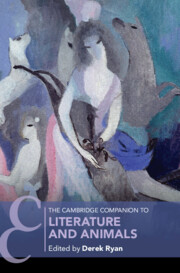Refine search
Actions for selected content:
2 results

The Cambridge Companion to Literature and Animals
-
- Published online:
- 26 October 2023
- Print publication:
- 09 November 2023
9 - Conclusion Calling and Being Called
-
- Book:
- Naming God
- Published online:
- 30 June 2023
- Print publication:
- 20 July 2023, pp 197-230
-
- Chapter
- Export citation
